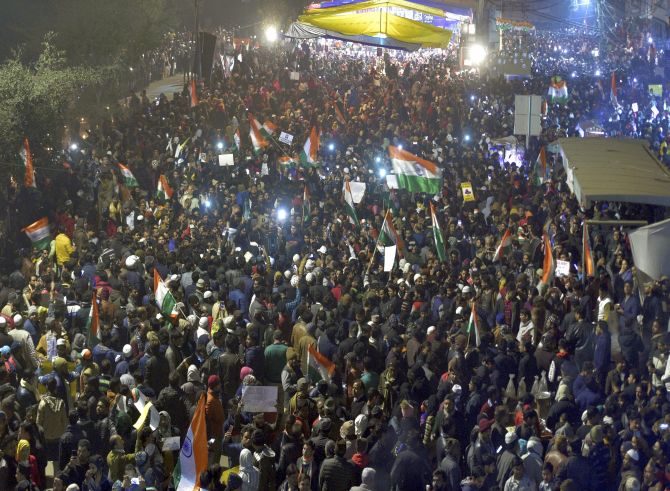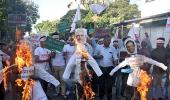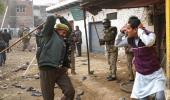People of different faiths came together on Sunday to participate in a sarva dharma sambhava ceremony at Delhi's Shaheen Bagh, where anti-citizenship law protestors have been demonstrating for almost a month now.

Congress leader Shashi Tharoor also joined the protest as thousands of people descended at the site in solidarity with those opposing the contentious Citizenship (Amendment) Act and a proposed pan-India National Register of Citizens.
"Heartwarming to meet and address the courageous women of Shaheen Bagh whose resistance is now legendary. 'Aap is sheher ki shaan hain, Bharat desh ki jaan hain' I told them in my address (sic)," Tharoor later tweeted.
The inter-faith ceremony, where there was a traditional Hindu-style 'hawan' and chants of Sikh 'kirtan', saw participants also reading out the Preamble of the Constitution and taking oath to preserve its "socialist, secular" values.
"Scriptures from the Gita, the Bible, the Quran were read and Gurbani held. Then the Preamble of the Constitution was also read out by people from varying faiths who are supporting this movement," said Syed Taseer Ahmed, one of the initial organisers of the protest.

Being a Sunday and the weather relatively warmer, more people could join the protest, he added.
The crowd swelled from hundreds in the morning to thousands by evening.
The concept of sarv dharm sambhav (equal respect for all religions or peaceful co-existence of all religions) was popularised by Mahatma Gandhi during India's freedom struggle against the British rule to promote inter-faith harmony.
Hundreds of protesters, including women and children, stayed put at Shaheen Bagh on Sunday, as their movement for withdrawal of the CAA and the NRC was set to complete a month on Monday.

Zainul Abidin, 44, of Ghaffar Manzil had started a hunger strike on December 16 to press the demand for repealing the CAA and after a fortnight was joined by Mehrunissa, 40, of Sarita Vihar.
Besides them, three elderly women now popular as the 'Dabang Dadis' of Shaheen Bagh too have been a constant sight at the centre stage of the protest venue since day one.
A replica of the India Gate has also come near the protest site with names of the people who have lost their lives during anti-CAA protests across the country inked on it.
Over two dozen such names are written on the replica including those from states like Assam, Karnataka, Bihar and most of them from Uttar Pradesh.
People have been protesting at Shaheen Bagh and nearby Jamia Millia Islamia in New Delhi to oppose the CAA and the NRC.

Besides Delhi, protests have unfolded in several parts of the country over the contentious law since it was passed on December 11 and have led to clashes at several places including Uttar Pradesh, where nearly 20 people have died.
According to the amended law, members of Hindu, Sikh, Buddhist, Jain, Parsi and Christian communities who have come from Pakistan, Bangladesh and Afghanistan till December 31, 2014 and facing religious persecution there will not be treated as illegal immigrants but given Indian citizenship. The law excludes Muslims.
Those opposing the law contend that it discriminates on the basis of religion and violates the Constitution.
They also allege that the CAA along withe the NRC is intended to target the Muslim community in India.
However, the central government has dismissed the allegations, maintaining that the law is intended to give citizenship to the persecuted people from the three neighbouring countries and not to take away citizenship from anyone.











 © 2025
© 2025